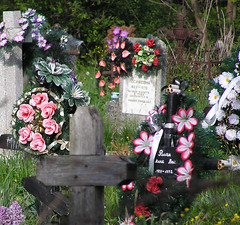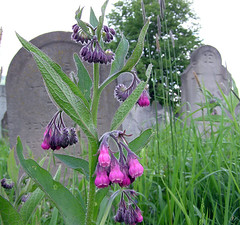The difference between Christian and Jewish cemeteries in Ukraine is striking. The Christian ones are generally well-tended and orderly; the stone, wood, or metal scrollwork crosses that top each grave sport elaborate wreathes of plastic flowers.

The Jewish ones, by contrast, are sad. Unkempt and chaotic. On our second day of graveyard-hopping I stumbled into a damp ditch that had been hidden by thigh-high grass, and could barely see the heads of my mother, our interpreter, and the gesticulating caretaker above the waving fronds. The graveyards that have stones at all--and there is a story there, about the cemetery we thought would have Mom's answers but turned out to have been cleared thirty years ago to make way for a bridge--are often a complete shambles. The stones that have not been stolen lean at crazy angles, or lie flat on the ground, covered with lichens and snails. Rubbish lay in drifts against the stones closest to the fence in one location, a graveyard that had obviously been sited on a steep hill because the land couldn't be used for something else. That one we had to muck through mud and cow shit to get to; chickens sheltered in the bushes, making angry noises at us through the foliage. A man ran by below, chasing his wayward cow.
This is what happens when the people who would care for the cemetery are forced to leave. But if you didn't know that many of Hungary's Jews had been rounded up (the region we visited was part of Hungary when my family was there) and taken away, you might get the impression that Jews don't care about the resting places of their dead.
Which is not to say that people aren't making an effort. The caretakers of the first one we visited, a sweet old couple who looked more like an Irish fishing family than anything else, live next to the cemetery and take the best care of it they can on the fifteen dollars a month allotted by the government. And of course there is an influx of money from Jews scattered by this most recent diaspora, either folded up and handed over discreetly at the site itself, or channeled through more organized structures. Jews pay to have the graveyards fenced so that no more stones will be taken and mowed so the stones are visible. One caretaker, a very handsome man in waders and baseball cap against the drizzle, will paint the engraved letters of the stones so they're easier to read, and send you a photograph.
Because it's hard to ensure that the work gets done. One young man from New York went to Ukraine a couple of times and hired local people to clean up the graveyards the first time; when he went the second time, he discovered that the people who did the work had gotten shaken down for half their pay by the mayor of the town.
But even if the stones are upright, the grass reasonably short, the livestock absent, these graveyards feel abandoned. There are very few people left to come and put candles or flowers on the graves. Which is why this struck me.

Sometimes these things are taken care of by other means.